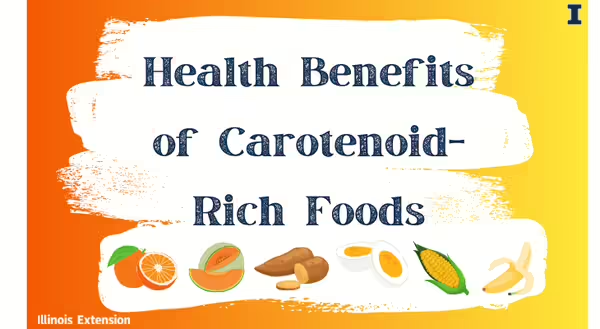
Where Carotenoids are Found
- Naturally occurring plant pigments. More than 650 types exist in nature. These pigments are found in nearly all fruits and green leafy vegetables.
- The common carotenoids found in human’s due to consumption include, lycopene, lutein, zeaxanthin, beta-cryptoxanthin and beta-carotene.
- Several of these carotenoids can be made on an industrial scale and found in fortified foods and supplements or as a food coloring agent.
Health Benefits of Consuming Foods Rich in Carotenoids
- Improved vision and eye health; reduced risk for age-related macular degeneration
- Improved cognitive function
- Reduced risk for coronary heart disease
- Abnormal growth of cells is limited which helps to prevent cancer
- Improved immune response
- UV protection for skin health
Antioxidant benefits- free radicals are a product of the body’s natural metabolism. However, an accumulation can be toxic and lead to the acceleration of the aging process and chronic conditions such as neurodegenerative and cardiovascular disorders, cancer, atherosclerosis, and ulcerative colitis.
The primary benefits of carotenoids are due to their anti-oxidant potential. They help to reduce the formation of free radicals and protect our cells from damage. In addition, beta-carotene is converted to vitamin A in the body which is essential for eye health. Lutein and zeaxanthin have been shown to help prevent age-related macular degeneration and cataract events in older adults. There is no recommendation for lutein and zeaxanthin at this point, however, the China Nutrition Society has implemented an intake of 10 mg and 2 mg per day of these carotenoids, respectively.
Dietary Sources of Common Carotenoids
Beta-carotene: sweet potatoes, carrots, dark leafy greens (spinach, kale), butternut squash
- Associated with vision and vitamin A, cognitive performance, UV protection, immune function
Lutein and/or zeathanxin: egg yolks, pistachios, orange peppers, corn, spinach, kale, asparagus
- Associated with eye health and reduced risk for age-related macular degeneration, cognitive functions, and infant nutrition
Lycopene: tomatoes and tomato products, red carrots, watermelons, grapefruit, guavas, rosehips
- Associated with heart health, cancer prevention, UV protection
Consuming a diet rich in fruits and vegetables ensures a steady supply of fiber, vitamins, minerals, and a variety of phytochemicals that can help prevent chronic conditions and contribute to a long, healthy life. Remember to fill your plate with a rainbow of colors for a variety of health benefits!
Interested in the red, purple, and blue foods? Learn more about the health benefits of anthocyanins- Eat red, blue, and purple foods for better health: University of Illinois Extension
Interested in the white subgroup? Learn more about the health benefits of anthoxanthin-rich foods- Eat white fruits and vegetables for better health: University of Illinois Extension
Interested in the green subgroup? Learn more about the health benefits of chlorophyll-rich foods- Eat green foods for better health: University of Illinois Extension
Sources:
Eggersdorfer, Mandred and Adrian Wyss. 2018. “Carotenoids in Human Nutrition and Health.” Archives of Biochemistry and Biophysics, 652. 18-26. https://doi.org/10.1016/j.abb.2018.06.001
Eisenhauer, Bronwyn et al. 2017. “Lutein and Zeaxanthin-Food Sources, Bioavailability and Dietary Variety in Age-Related Macular Degeneration Protection.” Nutrients vol. 9, 2 120. doi:10.3390/nu9020120